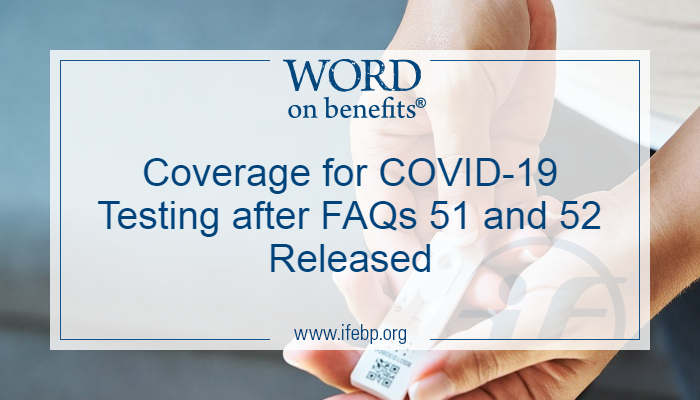

Early in 2022, the Departments of Health and Human Services (HHS), Labor, and Treasury (the Departments) issued two sets of guidance in the form of frequently asked questions (FAQ) 51 (released January 10, 2022) and 52 (released February 4, 2022) explaining how group health plans and insurers (Plans) must cover and reimburse over-the-counter (OTC) COVID-19 tests. When previous guidance was released in 2021, demand for OTC tests exceeded supply. Now that the tests are more readily available, both FAQs describe the coverage of OTC tests during the ongoing COVID-19 public health emergency (recently extended to April 16, 2022).
Our blog “Everything Employers Need to Know About Current COVID-19 Compliance” published on February 2, 2022, reviews the coverage options specified in FAQ 51. Plans can cover test costs up-front so plan participants would not pay at the point of sale—this is the “safe harbor” approach that the Departments have encouraged plans to take–or via reimbursement if participants are charged for tests at the point of sale.
As a recap, after January 15, 2022, OTC COVID-19 tests are covered without:
- cost sharing such as copayments, deductibles, or coinsurance incurred by the participant
- prior authorization from the Plan
- a prescription from a physician or a requirement to obtain an individual clinical assessment to access a test.
Which plans are required to cover OTC tests without the involvement of a health care provider?
Group health plans and health insurance issuers offering group and individual health insurance, including grandfathered plans.
Details on direct-consumer-shipping or “direct coverage” program compliance
While the core provisions of FAQ 51 were not changed, FAQ 52 clarifies the flexibility Plans can take in order to provide access to the OTC tests. The Departments revised the safe harbor requirements from FAQ 51 to ensure that Plans give adequate access to OTC COVID-19 tests with no upfront out-of-pocket expenses.
FAQ 52 elaborates on the safe harbor direct-to-consumer shipping program, described in FAQ 51 as “any program that provides direct coverage of OTC COVID-19 tests for participants, beneficiaries, or enrollees without requiring the individual to obtain the test at an in-person location. A direct-to-consumer shipping mechanism can include online or telephone ordering and may be provided through a pharmacy or other retailer, the Plan directly, or any other entity on behalf of the Plan.”
FAQ 52 specifies how a safe harbor design would be either compliant or noncompliant:
- The Plan would not be out of compliance if the direct coverage program does not include every brand of OTC COVID-19 tests available as there could be continued supply shortages for certain tests.
- Plans that otherwise meets the requirements of the safe harbor may continue to limit reimbursement to $12 per test (or the full cost of the test, whichever is lower) for OTC COVID-19 tests purchased outside of the direct coverage program.
- The Plan requirement to cover OTC COVID-19 tests does not include tests that are considered home-collection PCR tests and use a self-collected sample but require processing by a laboratory or other healthcare provider.
- Plans may prohibit reimbursement for tests purchased from a private individual via an in-person or online transaction, or from a seller that uses an online auction or resale marketplace.
- As part of the direct-to-consumer shipping program, Plans must pay for reasonable shipping costs of the tests.
How are employers expected to communicate testing information to employees?
While the Departments didn’t include a specific notification requirement, Plans need to provide adequate communication to participants, beneficiaries, and enrollees with general information about the types of tests available through the various retailers, including the shipping program.

How do the OTC test reimbursement requirements affect HSAs, FSAs, and HRAs?
OTC COVID-19 tests are considered a medical expense that can be reimbursed by health savings accounts (HSAs), health flexible spending accounts (FSAs) and health reimbursement arrangements (HRAs). However, individuals cannot be reimbursed twice for the same expense, so if a participant will be reimbursed by the Plan after purchasing a test, they can’t use HSA, FSA or HRA funds to purchase the test.
What about the free COVID-19 tests available through mail order?
COVIDtests.gov is a new government website available for every household to order four free tests mailed directly to a home address. Tests can be ordered either online through the website or by calling an 800 number. When the website initially became available in January, 500 million free tests were available but only 300 million have been ordered so far. Beginning the week of March 7, four additional free tests can be ordered through the same process.
“Developed by International Foundation Information Center staff. This does not constitute legal advice. Please consult your plan professionals for legal advice.”

Anne Newhouse, CEBS
Information/Research Specialist at the International Foundation of Employee Benefit Plans
Keep up with Word on Benefits:
- Mental Health Parity: What Plan Sponsors Need to Know During Period of Nonenforcement of 2024 Final Rule
- CMS Creditable Coverage Updates for Group Health Plans
- The New Look of Virtual Care: What’s Right for Employers and Plan Sponsors?
- Ontario’s New Long-Term Illness Leave Takes Effect Soon: What Employers Need to Know
- What Benefits Are Working? Attracting and Retaining Employees





